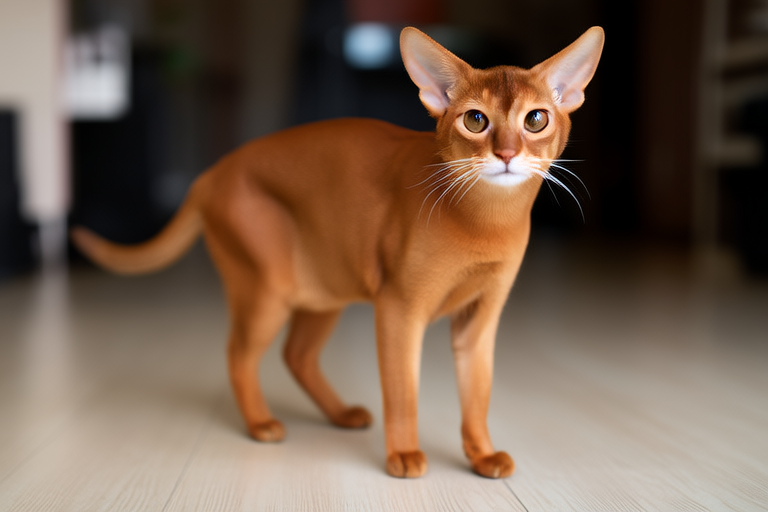The Ultimate Guide to Owning and Caring for an Abyssinian Pet
Introduction to Abyssinian Pets:
Abyssinians are one of the most ancient breeds of domestic cats, believed to have originated from the coastal regions of Ethiopia (formerly Abyssinia). Their sleek, muscular bodies and expressive faces make them a popular choice among cat lovers. Known for their playful and curious nature, these cats are perfect for families looking for an active and affectionate companion. With their striking coat patterns and vibrant green eyes, Abyssinians are sure to turn heads.
Unique Characteristics:
Abyssinians possess a short, dense coat that comes in various shades, such as ruddy, blue, fawn, and cinnamon. Their coats feature a distinctive ticking pattern, where each hair has alternating bands of color. This trait gives them a wild appearance, enhancing their charm. These cats are highly intelligent and have a strong hunting instinct, making them excellent at playing interactive games. They are also known for their high energy levels, requiring ample space to run and explore.
Dietary Needs:
Proper nutrition is crucial for maintaining an Abyssinian’s health and vitality. A balanced diet should include high-quality protein sources like chicken, fish, or lamb. It’s essential to avoid foods containing fillers, artificial preservatives, and sugars. Consult your veterinarian for recommendations on the best commercial cat food brands or prepare homemade meals under professional guidance. Fresh water should always be available, and treats should be given sparingly to prevent obesity.
Grooming Requirements:
Abyssinians require minimal grooming due to their short coats, but regular brushing can help remove loose hair and prevent matting. Weekly brushing sessions are recommended to keep their coat shiny and healthy. Bathing should only be done when necessary, as frequent bathing may strip their skin of natural oils. Additionally, regular nail trimming and dental care are important aspects of their grooming routine. Use pet-safe nail clippers and toothbrushes designed specifically for cats to ensure proper hygiene.
Exercise and Playtime:
Abyssinians are incredibly energetic and need plenty of opportunities to expend their energy through play. Interactive toys, climbing structures, and puzzle feeders are excellent ways to stimulate their minds and bodies. Engage them in daily play sessions to strengthen your bond and keep them mentally sharp. Consider investing in a laser pointer, feather wand, or automatic toy to encourage active play. Providing vertical spaces like cat trees and shelves will allow them to climb and perch, satisfying their natural instincts.
Common Health Issues:
While Abyssinians are generally healthy, they are prone to certain genetic conditions. Progressive retinal atrophy (PRA) is a degenerative eye disease that can lead to blindness. Periodontal disease, hyperthyroidism, and cardiomyopathy are other concerns that may affect this breed. Regular veterinary check-ups and early intervention can help manage these issues effectively. Keep an eye out for any changes in behavior, appetite, or physical condition, and consult your vet if you notice anything unusual.
Training Tips:
Abyssinians are intelligent and can be trained to perform simple tricks or respond to commands. Positive reinforcement techniques, such as clicker training or rewarding good behavior with treats, work well with this breed. Start training sessions when they are young to establish routines and boundaries. Consistency is key; use the same commands and rewards consistently to avoid confusion. Training should be fun and engaging, so incorporate games and puzzles into the process.
Suitable Living Environments:
Abyssinians thrive in environments that offer ample space for exploration and play. While they can adapt to apartment living, they benefit from having access to outdoor areas where they can safely roam. Ensure your home is secure and free from hazards such as toxic plants, open windows, or small objects that could pose choking risks. Provide cozy hiding spots and perches where they can relax and observe their surroundings. Supervised outdoor time can be beneficial, but it’s essential to protect them from dangers like traffic or predators.
Social Behavior with Humans and Other Pets:
Abyssinians are highly social and enjoy interacting with their human companions. They tend to form close bonds with family members and can be affectionate, often seeking attention and cuddling. However, they may become jealous if they feel neglected. Introducing them to new people or pets should be done gradually to ensure a smooth transition. Abyssinians usually get along well with other cats and dogs, especially if introduced at a young age. They are adaptable and can adjust to various household dynamics.
Advice on Selecting a Veterinarian:
Choosing the right veterinarian is crucial for ensuring your Abyssinian receives the best possible care. Look for a vet who specializes in feline medicine and has experience working with Abyssinians. Ask friends or fellow pet owners for recommendations, and consider visiting multiple clinics to find one that fits your needs. During your initial consultation, discuss your cat’s specific health concerns and ask about preventive care options. Building a trusting relationship with your vet will provide peace of mind and ensure your pet’s well-being.
By following these guidelines, you can provide a loving and nurturing environment for your Abyssinian pet. Remember, owning a pet is a long-term commitment that requires dedication and effort. With proper care and attention, your Abyssinian will bring joy and companionship to your life for many years to come.
